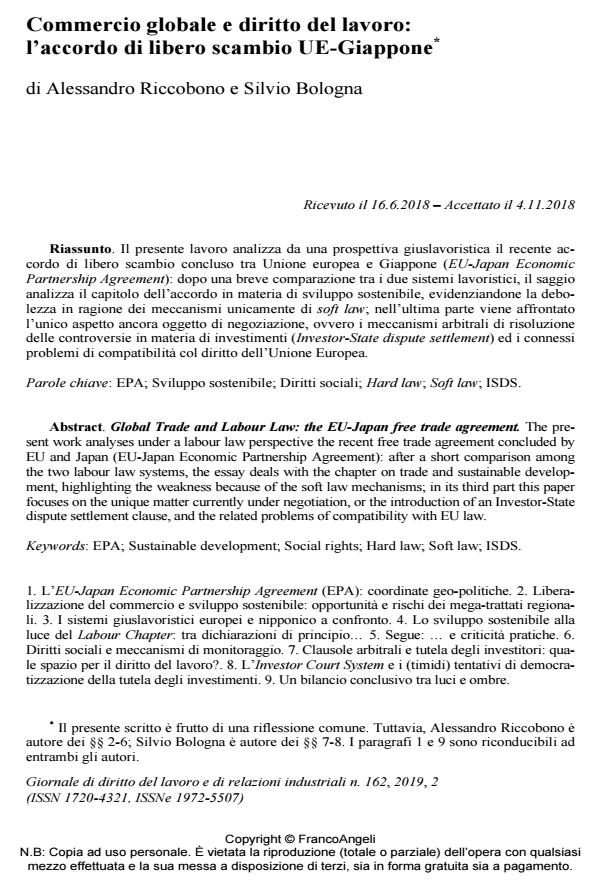Commercio globale e diritto del lavoro: l’accordo di libero scambio UE-Giappone
Titolo Rivista GIORNALE DI DIRITTO DEL LAVORO E DI RELAZIONI INDUSTRIALI
Autori/Curatori Alessandro Riccobono, Silvio Bologna
Anno di pubblicazione 2019 Fascicolo 2019/162
Lingua Italiano Numero pagine 29 P. 355-383 Dimensione file 309 KB
DOI 10.3280/GDL2019-162006
Il DOI è il codice a barre della proprietà intellettuale: per saperne di più
clicca qui
Qui sotto puoi vedere in anteprima la prima pagina di questo articolo.
Se questo articolo ti interessa, lo puoi acquistare (e scaricare in formato pdf) seguendo le facili indicazioni per acquistare il download credit. Acquista Download Credits per scaricare questo Articolo in formato PDF

FrancoAngeli è membro della Publishers International Linking Association, Inc (PILA), associazione indipendente e non profit per facilitare (attraverso i servizi tecnologici implementati da CrossRef.org) l’accesso degli studiosi ai contenuti digitali nelle pubblicazioni professionali e scientifiche.
Il presente lavoro analizza da una prospettiva giuslavoristica il recente accordo di libero scambio concluso tra Unione europea e Giappone (EU-Japan Economic Partnership Agreement): dopo una breve comparazione tra i due sistemi lavoristici, il saggio analizza il capitolo dell’accordo in materia di sviluppo sostenibile, evidenziandone la debolezza in ragione dei meccanismi unicamente di soft law; nell’ultima parte viene affrontato l’unico aspetto ancora oggetto di negoziazione, ovvero i meccanismi arbitrali di risoluzione delle controversie in materia di investimenti (Investor-State dispute settlement) ed i connessi problemi di compatibilità col diritto dell’Unione Europea.
Parole chiave:EPA; Sviluppo sostenibile; Diritti sociali; Hard law; Soft law; ISDS.
Alessandro Riccobono, Silvio Bologna, Commercio globale e diritto del lavoro: l’accordo di libero scambio UE-Giappone in "GIORNALE DI DIRITTO DEL LAVORO E DI RELAZIONI INDUSTRIALI " 162/2019, pp 355-383, DOI: 10.3280/GDL2019-162006